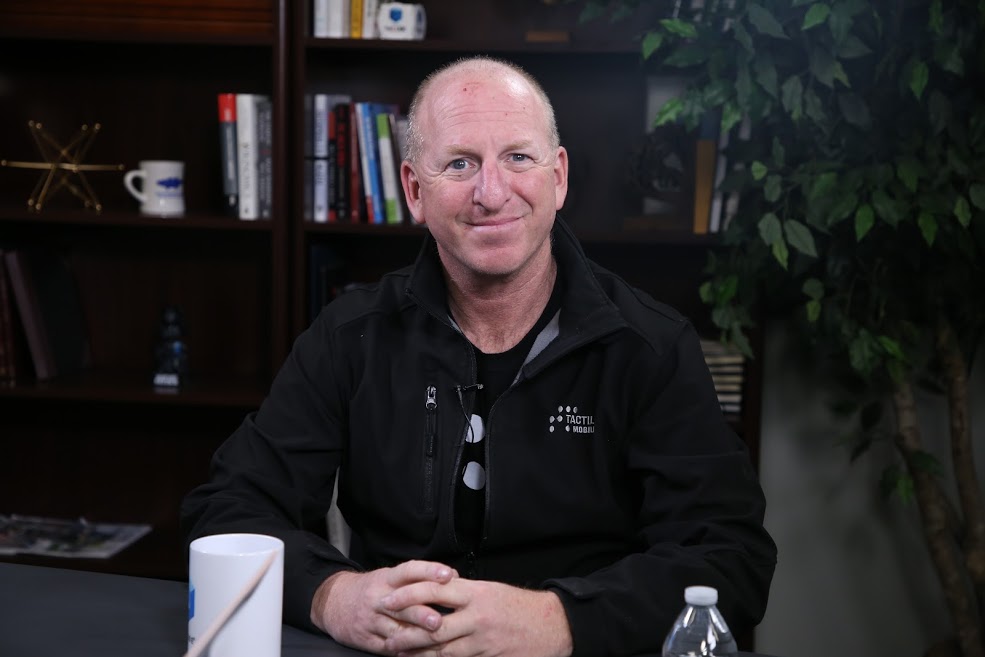 BIG DATA
BIG DATA
 BIG DATA
BIG DATA
 BIG DATA
BIG DATA
Cars have basically become computers on wheels, and there is one startup company that wants to give “feeling the road” a whole new meaning.
Tactile Mobility Ltd. was founded eight years ago with a mission to fill a missing gap for smart and autonomous vehicles. While advances in automotive technology resulted in a comprehensive visual-based platform, in-car systems lacked vehicle-to-road tactility or the ability to feel conditions in concert with car itself.
Tactile Mobility has created a software module to provide this missing piece through sensing and data analytics for smart and autonomous vehicles, city governments, and fleet managers.
“How do you take a vehicle from Point A to Point B at a set speed with minimum gas consumption using only software and data coming off the vehicle sensors?” asked Amit Nisenbaum (pictured), chief executive officer of Tactile Mobility. “That question started this whole company.”
Nisenbaum spoke with Dave Vellante (@dvellante), host of theCUBE, SiliconANGLE Media’s mobile livestreaming studio, in Boston, Massachusetts. They discussed the data collection and processing behind Tactile Mobility’s technology, a key investor and customer for the company, and the market role that Nisenbaum’s firm expects to play.
Tactile Mobility’s technology enables vehicles to virtually “feel” a bump, curve, or potentially hazardous condition on the road as a human would. A software module collects data provided by non-visual sensors, applies artificial-intelligence models and generates enough insight in the cloud to produce a real-time map of road features. The car then responds accordingly.
“We independently model the vehicle’s health, and we’re tuning each vehicle to become like a probe that feels the road conditions,” Nisenbaum explained. “If you’re approaching a pothole, the vehicle would tune the suspension to become harder or softer. If the vehicle is approaching black ice, it will probably want to slow down.”
German automobile manufacturer Porsche A.G. is both a customer and investor in Tactile Mobility. In October, Porsche and other investors added $9 million in funding for Nisenbaum’s company.
In addition to supplying an auto manufacturer such as Porsche, Tactile Mobility has found a market for its technology among city governments and fleet management businesses. Municipalities subscribe to the company’s growing database of road condition data, which can be collected regardless of the vehicle hardware platform involved.
“We’re agnostic to the technology; we’re the data layer behind all of that,” Nisenbaum said. “It allows municipalities to better plan maintenance, as well as dispatch crews to the locations of hazards in real time.”
While it may be years before fully autonomous or “Level Five” vehicles become available for mass adoption, there are plenty of cars on the roads today that have “Level Two” or partial autonomous technology. These involve vehicle systems that issue collision warnings to drivers and can automatically brake in certain circumstances.
It’s all part of the global vehicle telematics market that is predicted to grow from $39 billion to $104 billion over the next five years. This is the kind of business opportunity that Tactile Mobility is seeking to address.
“Everybody is doing Lidar and radar and cameras,” Nisenbaum said. “All of a sudden there is someone else that saw a neglected segment with an additional set of sensors, that sense of tactility that all of us are using when we’re driving. This is something that nobody paid attention to and that really caught my eye.”
Watch the complete video interview below, and be sure to check out more of SiliconANGLE’s and theCUBE’s CUBE Conversations.
THANK YOU